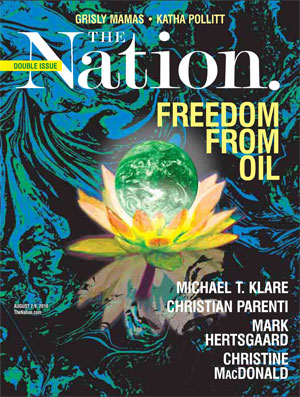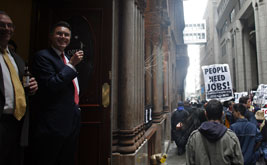Bird Over Jerusalem
Salisbury, Md.
I thoroughly agree with Kai Bird's "Next Week in Jerusalem?" [June 28]. I stand in both camps, with a son-in-law who is Jewish; a father who was probably Jewish, although he denied it; and a longstanding friend who is a Palestinian Arab with relatives in Palestine. I would go beyond what Bird says and ask the Israelis to release Marwan Barghouti from prison. It strikes me that he could engineer peace talks. I compare him to Nelson Mandela, imprisoned by South African whites and accused of being a communist and a terrorist. Before the second intifada, I heard a Palestinian leader say, "We didn't engage in terrorism for six years, and it got us nowhere." I was encouraged to hear recently that the Saudis have announced a fatwa against terrorists.
BETTY L. WHITMORE
Drummed in Your Dear Little Ear...
Waverly, Va.
In "You've Got to Be Carefully Taught" [June 28] Melissa Harris-Lacewell presents us with her hope that people like Arizona and Texas policy-makers "may find that the world has already moved beyond their fearful grasp." I hope she is right. But this optimistic view misses a larger point that calls for pessimism.
The civil rights movement of the '60s was primarily a political struggle for justice. Somewhere along the way it turned into a cultural struggle for tolerance. The political struggle disappeared, absorbed by the system and converted into something less threatening. There is no denying the enormous progress of the cultural struggle. But there is also no denying the regress in the fight for justice. The Reagan/Bush/Clinton/Bush/Obama era has been one of ever increasing inequity by way of deregulation, tax cuts for the wealthy, cuts to vital social services, corporate bailouts and increased militarization.
We should be grateful for the progress in the "decades-long culture war." But we also need to acknowledge the toll this shift of focus has taken on the political struggle. Cultural progress without political progress is superficial, and it distracts us from the more fundamental problem of injustice. We've been carefully taught indeed.
STEPHEN WARREN
Divesting From Israel
Brooklyn, N.Y.
Many thanks to Adam Horowitz and Philip Weiss for their thorough June 28 article "The Boycott Divestment and Sanctions Movement." BDS is rapidly becoming one of the defining civil society movements of our time, and the increasing discussion of its tactics and goals, still largely suppressed in most US media, is critically important.
Just since the article was published, Jewish Voice for Peace (jvp.org) has announced a campaign to get pension giant TIAA-CREF to divest from the occupation. This takes divestment nationwide. The campaign debuted with a petition from more than 250 people, including Naomi Klein, Noam Chomsky, Michael Ratner, Nadia Hijab, Richard Falk and a dozen rabbis. We secured more than 4,000 signatures in the first thirty-six hours. Clearly, people deeply concerned about Israel's actions are looking for a way to do something, and the BDS movement provides it.
REBECCA VILKOMERSON
Executive director, Jewish Voice for Peace
Washington, D.C.
Adam Horowitz and Philip Weiss tell a very selective tale about those who support and those who oppose the so-called BDS movement. They speak of a "nod toward the movement" by the Palestinian Authority in terms of the campaign to boycott goods made in settlements. That nod, however, was very much qualified. The article ignored the PA leadership's unequivocal stance that this boycott must not apply to goods made in Israel proper. "We are not boycotting Israel," Palestinian President Mahmoud Abbas told the boycott's organizers in Ramallah in May. "We have relations, and we import" products from the Jewish state, he added.
The authors mischaracterize Americans for Peace Now's views on boycotting Israel. APN won't endorse a systematic boycott of everything that is Israel. But we have said that it is not illegitimate for the Palestinians to launch a campaign focused on settlements. That is consistent with our position that boycott and divestment efforts shift their focus from Israel to the occupation and the settlements.
APN has never called BDS anti-Semitic. We have lamented that anti-Israel and anti-Semitic sentiments may be cloaked in criticism of Israel. At the same time, we have repudiated the tactic of Israel's knee-jerk defenders of jumping to discredit critics of Israeli government policies before taking an honest look at them.
DEBRA DeLEE, president and CEO
Americans for Peace Now
Amherst, Mass.
I write to clarify two details in Adam Horowitz and Philip Weiss's article, as far as they concern the official role of Hampshire College. In February 2009 Hampshire's trustees most definitely did not vote "to divest from six military companies involved in the occupation." Moreover, the college had had for many years a socially responsible investment policy. The board's investment committee merely reported to the full board on its decision to deploy a different third-party screen more in line with our values, a screen that at the time tagged some of the six companies but not all, and voted to suspend the policy until it could be updated. In November Hampshire's chapter of Students for Justice in Palestine did host a BDS conference, but with the clear and stated understanding that SJP, not the college, was hosting the event.
RALPH HEXTER
President, Hampshire College
Emily's 'Epilepsy'—More 'Potted Theory'
London
James Longenbach in "Ardor and the Abyss" [July 5] properly questions the need for a tidy diagnosis of epilepsy to explain Emily Dickinson's reclusion. In fact, Dickinson's latest biographer, Lyndall Gordon (Lives Like Loaded Guns: Emily Dickinson and Her Family Feuds), made the diagnosis based on a complete misunderstanding of nineteenth-century pharmacotherapy (a field I am well versed in). From an 1874 formula for epilepsy containing chloral hydrate, glycerine and peppermint, Gordon assumed glycerine—which Dickinson took in 1851-54—was the active ingredient. In fact, it was the bitter medicine chloral hydrate, first noted as an anticonvulsant in 1870. To anyone's knowledge Dickinson never took chloral hydrate. Glycerine was a sweet carbohydrate used to disguise the taste of bitter drugs, and as a supposed nutrient for consumption (tuberculosis), which Dickinson's physician may have suspected. In no medical text or pharmacopeia of the time was glycerine ever suggested as an anticonvulsant. Dickinson even recommended the drug to her brother for his cough. There have been too many potted theories to "explain" Dickinson's magnificent poetry and mysterious persona, which trivialize the poet; this is but the latest.
NORBERT HIRSCHHORN, MD Read More
Our Readers












